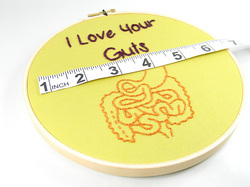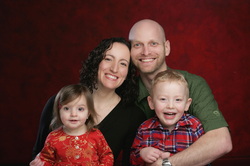 IBS or Irritable Bowel Syndrome affects approximately 15% of the US population according to recent research, though only 5-7% of the adult population has actually been diagnosed with the disease. Its a functional disorder of the Large Intestine and is typically characterized by alternating constipation and diarrhea combined with intestinal cramping, though some people will tend towards more constipation or more diarrhea depending. In summary - not fun. As someone who suffers from IBS I can tell you that it can be painful, debilitating, embarrassing and even exhausting at times. I can also tell you that there is hope, that while Western medicine does now have pharmaceutical tools to treat IBS, it doesn’t hold the only key or the only answers. Acupuncture is an incredibly powerful treatment for IBS, is completely natural, and is actually what inspired me to become an acupuncturist because of the difference it made in my life. I suffered daily bouts of cramping, constipation and diarrhea for 7 years and then tried Acupuncture. In 3 months, my symptoms were completely gone and Chinese Medicine did not require me to continue regular treatment to maintain results. It was astonishing and life changing, and is absolutely the reason I am here writing this article today. What Is IBS? What Causes IBS?The simplest definition of Irritable Bowel Syndrome or IBS is bowel irregularity including discomfort and constipation or diarrhea that lasts 3 months or more. Technically, IBS is a functional disorder of the bowel. This means that the smooth muscle of the Large Intestine is affected and cannot perform regular peristalsis or movement. Instead of a smooth squeeze along the intestines, the IBS sufferer will experience sections of the Large Intestine cramping and releasing irregularly causing discomfort and bowel pattern changes, or lack of pattern altogether. The medical criteria for diagnosing IBS (ROME 3 Criteria) is actually very simple: Recurrent abdominal pain or discomfort** at least days/month in the last months associated with two or more of the following: According to the National Institute of Health, people who have IBS experience some combination of the following IBS symptoms:
Acupuncture and IBS - IBS Treatment, IBS ManagementAcupuncture is an excellent treatment for IBS. In the short term it can calm down an acute IBS episode relieving pain, discomfort and improving bowel patterns, and long term it can be a tool for IBS management and in some cases, it can provide complete resolution of symptoms. Treatment is recommended weekly for 4-6 weeks as a starting course, though long time sufferers of IBS can require 3-6 months of regular acupuncture to create a lasting effect. When combined with herbs, diet and lifestyle changes if needed, Acupuncture can be completely transformative. A trial course of treatment along with assessment by a qualified practitioner determines how much intervention beyond acupuncture is necessary in any individual case. Chinese Medicine defines IBS by several different energetic patterns. The possibilities for individual diagnosis are quite extensive since TCM treats every individual differently, but there are three diagnoses that are more common than the rest:
The differential diagnoses above, which can be combined in some cases, determines the specific acupuncture points and herbs selected in treatment. Research shows that acupuncture and herbal treatment for IBS is quite effective - upwards of 80% of patients in some studies report improvement (Bensoussan et al. 1585-1589, 1998). Research also shows that acupuncture can virtually eliminate sympathetic nervous system response (fight or flight response) in some cases which lends credence to the validity of acupuncture to treat stress induced IBS in particular (Middlekauff et al. 399-406, 2002). Rebecca's Story I suffered from IBS for 7 years, from the age of 14 to 21. I developed an eating disorder in highschool and a combination of overeating plus excessive laxative use altered my bowel patterns permanently. Even though I resolved those behaviors and patterns by the time I started college, I continued to suffer from IBS regardless of my eating habits. I experienced pain, cramping and bloating every day and variable alternating diarrhea and constipation. It was exhausting and felt like chronic pain, like a constant background noise to my life I had to fight against to consciously do everything. I didn’t know what to eat or what not to eat and it didn’t really seem to matter - I suffered no matter how good or how bad my eating habits were. The only thing that consistently helped was exercise so I got a lot of it - 10+ hours a week of martial arts, dance, weight lifting and cardio at different times. I went to see my western physician who told me I had IBS and recommended I try to eat healthy and hope it would resolve. She offered no specific dietary advice and, luckily for me frankly, there were no pharmaceutical interventions available at the time. I was actually getting ready to go to China for a year to study overseas and I was very frightened. If I couldn’t eat “regular” food in America that I was used to without having IBS, what was I going to do in China where the water isn’t clean and the foods are fairly different? My mother had been seeing an acupuncturist since I was 9 years old, so she took me to see him during the summer before I left for China. He had a clear diagnosis for me - even though I didn’t understand what it was or what it meant - specific dietary recommendations and a clear treatment plan. He recommended weekly acupuncture and daily Chinese herbs for 3 months. After two weeks my pain was 75% resolved and my bowel patterns were almost normal. By the 3 months mark all of my IBS symptoms were completely resolved. It felt like a miracle to go from 7 years of pain and discomfort to nothing, but there it was - Chinese medicine had a diagnosis, a treatment and ultimately for me, a cure. Six years later, as I was coming to the end of grad school, my symptoms resurfaced due to stress and hormonal changes. I tried all the same things but it didn’t quite work - ultimately I learned that I had developed a Gluten intolerance (most likely due to epigenetic changes related to stress) and a soy sensitivity. Once I cut those things out of my diet, I had no further problems and I continue to enjoy regular comfortable digestion to this day. I completely have Acupuncture and Chinese Medicine to thank for my healthy digestive function. The complete resolution of my symptoms at age 21 was phenomenal, and even my later gluten and soy sensitivity revelation was due to the guidance of another LAc. That experience put me on the path that led to me becoming an Acupuncturist, and helping people with digestive disorders is one of my true passions. What do I do for IBS? Tips for Managing IBS.As a sufferer myself, I know how difficult it can be to deal with this disorder. My number one recommendation if you have IBS is to see an Acupuncturist for a thorough assessment and to follow a 1-3 month course of treatment to see if Acupuncture is the right course for you. Including that, however, here are some simple tips that can help with managing IBS:
|
AuthorsRebecca M H Kitzerow is a Licensed Acupuncturist practicing in La Center, Washington. With over a decade of experience she has won 10 Nattie consumer choice awards from Natural Awakenings Magazine since 2014. Archives
July 2024
Categories
All
|
Photos from Hey Paul Studios, BeGreen_Studio, Pawel Pacholec, 1950sUnlimited, toulupaliaqaz, Joelk75, OnTask, Robert Gourley, cnu_sports, Mitya Ku, wuestenigel (CC BY 2.0), FootMassagez, 401(K) 2013, Mariana Heinz, @EdwardTerry, fishhawk, liverpoolhls, torbakhopper, Boemski, dolomitibl, Driscolltheque, Dave n Laura, Vaping360, MVWorks, Life Mental Health, MVWorks, mikefats, Scot Nelson, jfl1066, wZa HK, ruurmo, Guadalupe Cervilla, Army Medicine, GViciano, torbakhopper, adrigu, Saulo Cruz, Ben Cumming, marniejoyce, kcxd, JasonCorey, kanenas.net, Live to Create Photography, gm.esthermax, Unique Hotels Group, Zenspa1, mysiana, Tobias Lindman, Leader Nancy Pelosi, Kristoffer Trolle, swanksalot, Bill Selak, Parker Knight, stimpsonjake, Gedankensprudler, SuperFantastic, tonynetone, marniejoyce, JeepersMedia, Illusive Photography, 'Ajnagraphy', Iban Torras, scotted400, gtall1, dvanzuijlekom, BPPrice, Skley, torbakhopper, Renato Ganoza, anka.albrecht, QUOI Media, Public Domain Photos, Instant Vantage, Victor Tongdee, Free Grunge Textures - www.freestock.ca, sportEX journals, Nadja Tatar, angela n., marniejoyce, MVWorks, Karolina Kabat, Thomas Fisher Rare Book Library, UofT, ginnerobot, tracilawson, haven't the slightest, My Photo Journeys, Pierre Willemin, Florena_Presse, SuperFantastic, colindunn, zzkt, TraumaAndDissociation, ER24 EMS (Pty) Ltd., shixart1985 (CC BY 2.0), marniejoyce, Tomás Fano, freestock.ca ♡ dare to share beauty, Archives New Zealand, Jaykhuang, airdrie.m, Go-tea 郭天, OnTask, wuestenigel, focusonmore.com, Disney | ABC Television Group, Andrew Gustar, Didriks, ConstructionDealMkting, charlywkarl, barnimages.com, Lel4nd, runwaypilates, michaelstephanfotografie, McLevn, TraumaAndDissociation, eLife - the journal, Lars Plougmann, wuestenigel, shixart1985, boviate, davis.steve32, kevin dooley, @the.photoguy (insta), frederic.gombert, Feathering the Nest, Victor Tondee, shixart1985, wuestenigel, Joe K Gage, kennethkonica
 RSS Feed
RSS Feed
